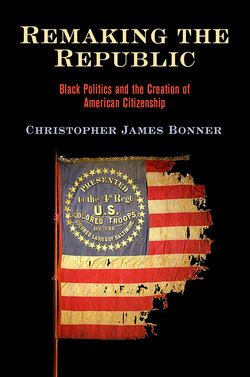Remaking the Republic

Реклама. ООО «ЛитРес», ИНН: 7719571260.
Оглавление
Christopher James Bonner. Remaking the Republic
Отрывок из книги
Remaking the Republic
Series editors:
.....
Cornish published specific critiques of state laws that presented barriers on a path to justice. His editorial seeking opportunities for black men as “cartmen and porters” not only reflected ideas about the freemanship but also responded directly to the text of New York’s 1821 constitution. Article II, Section 1 of the constitution established basic qualifications for voters—male citizens, twenty-one years old, residents in the state for at least six months, and had paid a property tax. The constitution also allowed any man to vote who had been exempted from taxation, performed militia duty, been exempted from the militia because he was a fireman or had worked in building public roads. At the end of that list, the constitution declared that “no man of colour” could vote without meeting the $250 property requirement.47 White men’s work offered them a variety of routes to the polls; labor was critical to lawmakers’ ideas about voting and citizenship in the early antebellum period. And so when Samuel Cornish promoted black agrarian selfsufficiency or called for people to do useful work in their communities, he demanded rights in the terms state lawmakers had established. Talking about specific kinds of men’s work delivered a targeted attack on black exclusion. Disfranchisement was unjust because black men were walking the very paths to suffrage that lawmakers had built for white men. Cornish was redefining the community, pushing lawmakers to think of “men of colour” within the category of “male citizens” that comprised the electorate.
Searching for an example that connected personal conduct, citizen status, and suffrage, Cornish turned to the government of British Honduras, the Central American colony that would become Belize. He quoted the white editor of the New York Albion, who was surprised that “the coloured population there seems to have equal privileges with the white, and are actually struggling with them for political ascendancy.” Any person, black or white, who had been born in the colony and possessed $3,000 worth of property could be elected to the colonial legislature. While Cornish might have disagreed with the property qualification, the fact that it was universal reflected the truth of human equality. “Why should there be any distinction among the worms of the dust,” he wrote, “the occupants of Jehovah’s footstool, save that which results from merit?” Christianity decreed all men to be equal and offered a foundation for their personal conduct. “Cultivated minds and sanctified hearts, would so qualify our brethren in Honduras for the exercise of their rights, as to leave the Albion, no cause for surprise.” He concluded, “The same causes … will produce the same effects in this country.”48 Protestantism was central to Cornish’s political ideology, as it was for many northern black activists. He put his faith to work, advocating “sanctified hearts” because they showed people’s fitness for political rights.
.....